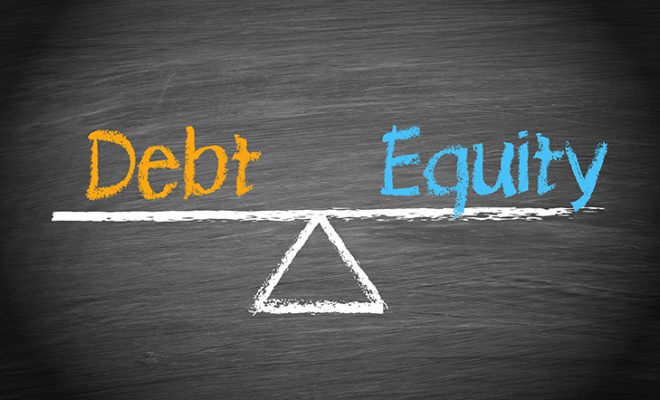What Is Debt to Equity Ratio? Why You Should Know About It?

According to investment experts, when it comes to investing in a stock, one needs to evaluate the finances and the operating model of the company first. Generally, several financial metrics and ratios are considered by the investor community for determining the company’s current financial health. One of these critical metrics for assessing the company’s financial position is the debt to equity ratio.
Table of Contents
What is the debt to equity ratio?
The debt-equity ratio (frequently referred to as the DE ratio, leverage ratio, or gearing ratio) is a measure of the company’s total debt or liabilities to its shareholder’s equity. Total debt comprises of both long-term and short-term debt. Calculated by dividing the total debt or liabilities with the total shareholder’s equity, an ideal leverage ratio is 1. However, there can be certain exceptions depending on the industry.
Debt equity helps measure the company’s financial health and solvency quotient. It also indicates the ability of a company to compensate its shareholders over debt providers.
How does debt equity impact the company?
A low debt to equity ratio provides adequate borrowing room to sustain long-term growth prospects. It further translates to enhanced cash inflow and adds value to the shareholders by keeping the equity portion fixed. This results in an improved credit rating and increased flexibility by progressively moderating debt costs.
On the contrary, a high to very high debt to equity ratio is considered as an indicator of the company’s declining financial health and stability. However, it is important to note that the ideal debt to equity ratio may vary from one industry to another. For instance, a capital-intensive industry has a higher acceptability rate as these companies generally have a high capital requirement.
Why it is important for you?
The debt-equity ratio showcases whether the shareholder’s equity is good enough to close out the debt obligations in the event of liquidation. Here are a few points which entail why the debt-equity ratio is important.
Liquidity
For a potential investor assessing the financial health of the company is of paramount importance. The debt to equity ratio, an essential component of ratio analysis under financial analysis, is generally considered a potent indicator of the financial health of a company. A company with a high debt to equity ratio indicates that the company is low on liquidity. It also means that the company is heavily dependent on its creditors to funds its financial obligations required for the smooth running of its day-to-day operations. It has been observed that companies with a higher debt to equity ratio have a higher propensity to go bankrupt. For a potential investor, this can be a warning signal. Companies with low to moderate debt to equity ratio are like to be cash-rich, therefore has better flexibility.
Impact on shareholder’s earnings
A high debt to equity ratio means a higher cost of funding and diminishing profitability. Banks and non-banking financial institutions (NBFC) are the two major sources of funds for a company. Usually, the lending rates are dependent on the financial health, creditworthiness, and liquidity position of the company. A high debt to equity ratio means the company is already high on debt and low on liquidity. In such a situation, the funding institutions are likely to charge higher than the normal interest rate for providing the company with the required funds. A high-interest rate would mean the interest cost is likely to go up. With the cost of servicing the debts eating away a major portion of the profit, investors are likely to get a very nominal return on their investment. Companies with a favorable debt to equity ratio are likely to have better bargaining power in terms of funding rate. Moreover, with a low funding cost, shareholders are likely to enjoy a higher return on their investment.
Impact on share price
Companies with a higher debt to equity ratio have a higher probability of a credit default. In case of a default, creditworthiness, credit rating, and the reputation of the company get impacted, which in turn can have a negative impact on the company’s share price. In the case of recurring defaults, banks and lenders can drag the company to file for bankruptcy. Companies with low to moderate debt-equity ratio and high return on equity are likely to attract investors’ attention owing to the strength of its balance sheet. The more attention the company gets from the investors, the higher is the probability of the share price climbing up.
Impact on the company’s day-to-day operations
Working capital financing requires well-strategized regular funding arrangements to ensure that the business operations run smoothly. Several companies routinely opt for working capital loans from different financial institutions. Companies with a high debt to equity ratio may find it extremely difficult to regularly source finances at reasonable rates to funds its working capital requirement. Without the working capital, the day-to-day business operations can come to a halt, which in turn can impact profitability. Financial institutions and lenders are more than willing to extend a credit facility to the companies with low to moderate debt-equity ratio.
Additional funding requirement
Additional funding requirements may arise for different reasons such as Greenfield or Brownfield expansion, up-gradation of machinery, buying new updated equipment, and bulk purchase of raw materials, among others. In such a scenario, if internal accruals are not enough, a company may approach a financial or lending institution to support with the additional funds. In this kind of scenario, companies with a low to moderate debt-equity ratio can readily get funding. This is because lending institutions are assured of the repayment, thanks to the strong cash balance of the company. For companies with a high debt to equity ratio, the lending institutions might refuse to extend the credit facility or may extend the facility with some unfavorable terms because the risk of default is already high.
To sum it up
The debt to equity ratio is important for an investor, as it can help ascertain the present financial status and level of risk associated with a particular company. But it is equally important to know the industry benchmark as different industries have different capital requirements and performing a peer comparison without the industry benchmarking may not give you the desired outcome.
Do you wish to know industry specific information on debt to equity ratio? Reach out to financial advisors today.
















